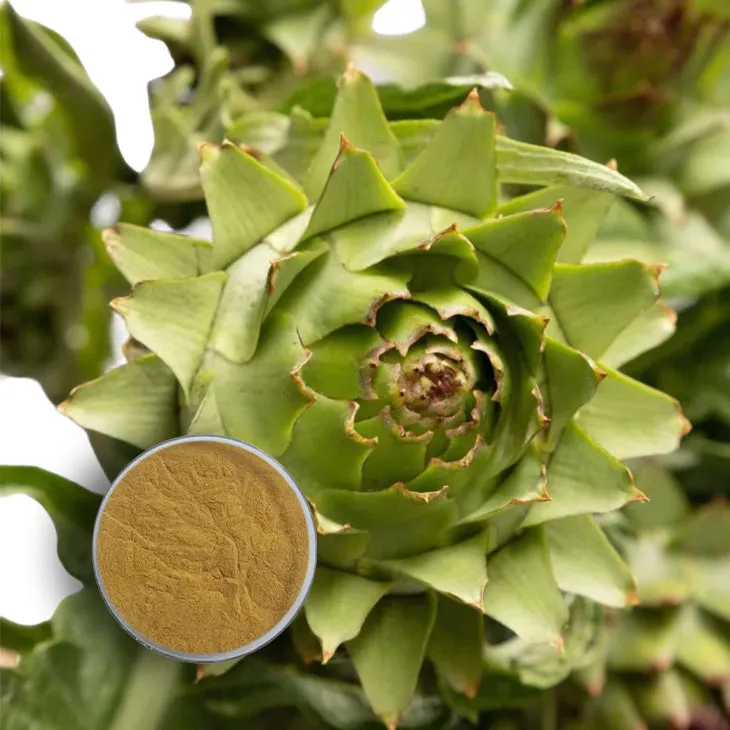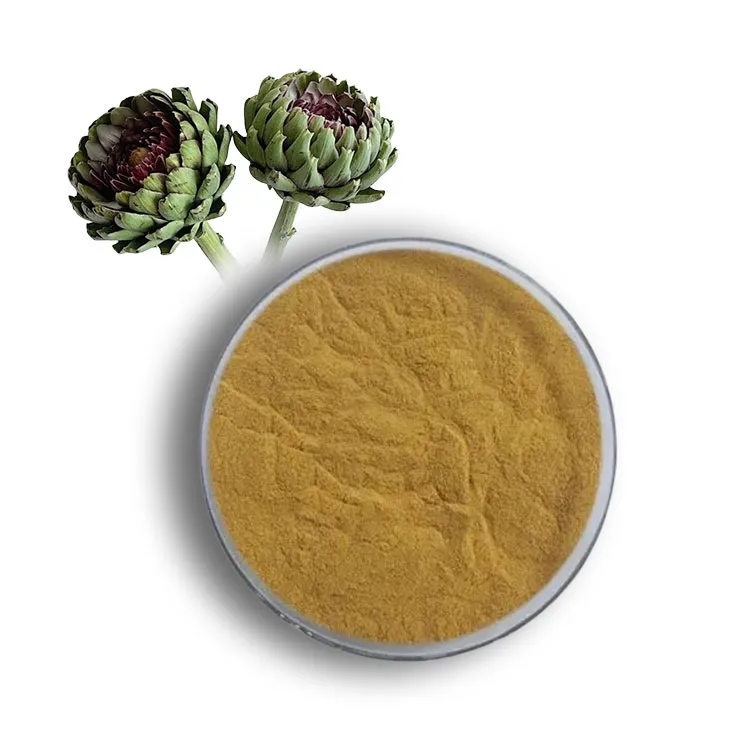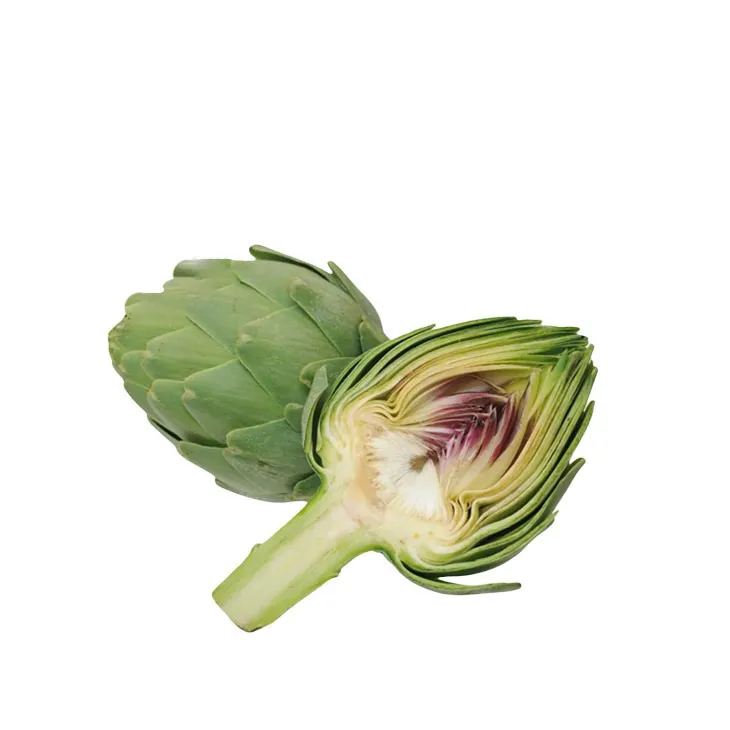- 0086-571-85302990
- sales@greenskybio.com
Artichoke leaf extract can reduce high blood pressure.
2024-11-12

Introduction
Hypertension, or high blood pressure, is a major global health concern. It is often referred to as the "silent killer" as it can lead to serious complications such as heart disease, stroke, and kidney failure without obvious symptoms in the early stages. In recent years, there has been growing interest in natural remedies for various health conditions, and Artichoke Leaf Extract has emerged as a potential agent for reducing high blood pressure.

What is Artichoke Leaf Extract?
Artichoke (Cynara scolymus) is a plant that has been used for centuries for its medicinal properties. The extract from its leaves contains a variety of bioactive compounds. These include flavonoids, phenolic acids, and inulin. Flavonoids are known for their antioxidant properties, which can help protect the body against oxidative stress. Phenolic acids also contribute to the antioxidant activity, and inulin has prebiotic effects in the gut.

Scientific Evidence for Blood Pressure - Lowering Effects
Animal Studies
Several animal studies have provided evidence of the blood - pressure - lowering effects of Artichoke Leaf Extract. In rodent models of hypertension, the extract has been shown to significantly reduce both systolic and diastolic blood pressure. For example, in a study where rats were made hypertensive through a high - salt diet, treatment with artichoke leaf extract led to a decrease in blood pressure levels over a period of weeks. The mechanisms proposed in these animal studies include vasodilation (widening of blood vessels) and modulation of the renin - angiotensin - aldosterone system (RAAS).
Human Studies
Human clinical trials have also been conducted to evaluate the effect of artichoke leaf extract on blood pressure. In some small - scale trials, participants with mild to moderate hypertension who took artichoke leaf extract supplements for a certain period showed a reduction in blood pressure levels. However, the results have not been entirely consistent across all studies. Some larger - scale trials are still needed to confirm the efficacy more definitively. One possible reason for the inconsistent results could be differences in the composition of the extract used, the dosage, and the characteristics of the study participants.

Mechanisms of Action
Vasodilation
One of the key mechanisms by which artichoke leaf extract may lower blood pressure is through vasodilation. The bioactive compounds in the extract can act on the smooth muscle cells in the blood vessel walls. They can cause these cells to relax, leading to an increase in the diameter of the blood vessels. When the blood vessels widen, the resistance to blood flow decreases, which in turn reduces blood pressure. This is similar to the action of some medications used to treat hypertension, such as calcium channel blockers.
RAAS Modulation
The renin - angiotensin - aldosterone system (RAAS) plays a crucial role in blood pressure regulation. Renin is an enzyme that is released when blood pressure drops or when there is a decrease in sodium levels in the kidneys. Renin then converts angiotensinogen to angiotensin I, which is further converted to angiotensin II by the angiotensin - converting enzyme (ACE). Angiotensin II is a potent vasoconstrictor and also stimulates the release of aldosterone, which causes the kidneys to retain sodium and water, increasing blood volume and blood pressure. Artichoke leaf extract may interfere with this system at different levels. It could potentially inhibit the activity of ACE or reduce the release of renin, thereby helping to lower blood pressure.
Potential Benefits Beyond Blood Pressure Control
- Antioxidant Protection: As mentioned earlier, the flavonoids and phenolic acids in artichoke leaf extract have antioxidant properties. This can help protect the body's cells from damage caused by free radicals. Free radicals are unstable molecules that can damage cells and contribute to the development of various diseases, including cardiovascular diseases.
- Improved Digestion: Inulin, present in artichoke leaf extract, is a type of prebiotic. It can promote the growth of beneficial gut bacteria. A healthy gut microbiome is associated with better digestion and absorption of nutrients, as well as improved immune function.
- Cholesterol - Lowering Effects: Some studies suggest that artichoke leaf extract may have a positive impact on cholesterol levels. It may help to reduce LDL (low - density lipoprotein) cholesterol, also known as "bad" cholesterol, while maintaining or increasing HDL (high - density lipoprotein) cholesterol, or "good" cholesterol. This can be beneficial for overall cardiovascular health.
Dosage and Administration
The appropriate dosage of artichoke leaf extract for blood pressure management has not been firmly established. In some studies, participants have taken doses ranging from 300 to 1800 mg per day. However, it is important to note that self - medicating with artichoke leaf extract without medical advice may not be safe. It is always recommended to consult a healthcare provider before starting any new supplement. The extract can be taken in the form of capsules, tablets, or liquid extracts.
Precautions and Side Effects
While artichoke leaf extract is generally considered safe for most people, there are some precautions to be aware of. Some individuals may experience mild side effects such as gastrointestinal discomfort, including bloating, gas, or diarrhea. People with allergies to artichokes or related plants should avoid taking the extract. Also, since artichoke leaf extract may have an effect on blood pressure and blood clotting, those taking blood - thinning medications or with bleeding disorders should use it with caution and under medical supervision.
Conclusion
Artichoke leaf extract shows promise as a natural agent for reducing high blood pressure. The scientific evidence from animal and some human studies suggests that it may have beneficial effects on blood pressure through mechanisms such as vasodilation and RAAS modulation. Additionally, it may offer other potential health benefits. However, more research, particularly large - scale clinical trials, is needed to confirm its efficacy and safety for widespread use in hypertension management. Until then, it should be used with caution and under the guidance of a healthcare professional.
FAQ:
What is artichoke leaf extract?
Artichoke leaf extract is a substance derived from the leaves of the artichoke plant. It contains various bioactive compounds such as cynarin, chlorogenic acid, and flavonoids. These components are thought to contribute to its potential health - promoting effects, including those related to blood pressure regulation.
How does artichoke leaf extract reduce high blood pressure?
There are several proposed mechanisms. The bioactive compounds in artichoke leaf extract may help relax blood vessels, improve endothelial function (the inner lining of blood vessels), and reduce the resistance in the arteries. This can lead to a decrease in blood pressure as the blood can flow more easily through the vessels.
Is there scientific evidence to support artichoke leaf extract's effect on high blood pressure?
Yes, there are some scientific studies. Some research has shown that artichoke leaf extract can lead to a modest reduction in blood pressure in hypertensive individuals. However, more research is still needed to fully understand its efficacy, optimal dosage, and long - term effects.
Are there any side effects of using artichoke leaf extract for high blood pressure?
Generally, artichoke leaf extract is considered safe for most people when used in appropriate doses. However, some people may experience mild side effects such as gastrointestinal discomfort, including bloating, flatulence, or an upset stomach. People with allergies to artichokes should avoid using the extract.
How should artichoke leaf extract be taken for high blood pressure?
The dosage and form of artichoke leaf extract can vary. It is often available in supplement form, such as capsules or tablets. It is important to follow the instructions on the product label. However, it is also advisable to consult a healthcare provider before starting any new supplement, especially if you have existing health conditions or are taking other medications.
Related literature
- The Effects of Artichoke Leaf Extract on Blood Pressure: A Systematic Review"
- "Artichoke Leaf Extract: Potential Benefits for Cardiovascular Health"
- "Bioactive Compounds in Artichoke Leaf Extract and Their Role in Hypertension"
- ▶ Hesperidin
- ▶ citrus bioflavonoids
- ▶ plant extract
- ▶ lycopene
- ▶ Diosmin
- ▶ Grape seed extract
- ▶ Sea buckthorn Juice Powder
- ▶ Beetroot powder
- ▶ Hops Extract
- ▶ Artichoke Extract
- ▶ Reishi mushroom extract
- ▶ Astaxanthin
- ▶ Green Tea Extract
- ▶ Curcumin Extract
- ▶ Horse Chestnut Extract
- ▶ Other Problems
- ▶ Boswellia Serrata Extract
- ▶ Resveratrol Extract
- ▶ Marigold Extract
- ▶ Grape Leaf Extract
- ▶ blog3
-
High purity olive leaf extract
2024-11-12
-
Lavender oil extraction method
2024-11-12
-
100% organic virgin sea buckthorn fruit oil
2024-11-12
-
Lotus leaf extract powder factory in China
2024-11-12
-
China aged garlic extract supplier
2024-11-12
-
Deer antler extract powder manufacturer
2024-11-12
-
Saw palmetto extract vs whole herb
2024-11-12
-
Wheat Germ Extract
2024-11-12
-
Maca Extract
2024-11-12
-
Baicalin
2024-11-12
-
melatonin extract
2024-11-12
-
Kidney Bean Extract
2024-11-12
-
Sea buckthorn Juice Powder
2024-11-12
-
Kupilu Extract
2024-11-12
-
Aguaje Extract
2024-11-12
-
Golden Seal Extract
2024-11-12
-
Moringa powder
2024-11-12





















